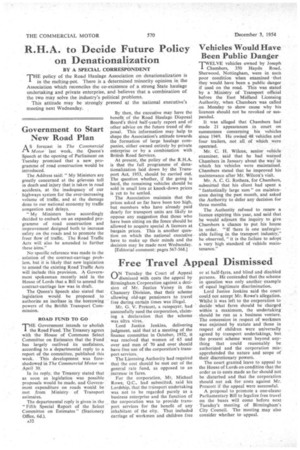R.H.A. to Decide Future Policy on Denationalization
Page 34

If you've noticed an error in this article please click here to report it so we can fix it.
BY A SPECIAL CORRESPONDENT THE policy of the Road Haulage Association on denationalization is in the melting-pot. There is a determined minority opinion in the Association which reconciles the co-existence of a strong State haulage undertaking and private enterprise, and believes that a combination of the two may solve the industry's political problems, This attitude may be strongly pressed at the national executive's meeting next Wednesday.
By then, the executive may have the benefit of the Road Haulage Disposal Board's third half-yearly report and of other advice on the future trend of disposal, This information may help to shape the Association's attitude towards the formation of large haulage companies, either owned entirely by private enterprise or by a combination with British Road Services.
At present, the policy of the R.H.A. is that the full programme of denationalization laid down by the Transport Act, 1953, should be carried out. The question whether, if the going is hard, the remaining vehicles should be sold in small lots at knock-down prices is yet to be settled.
The Association maintain that the prices asked so far have been too high, but members who have already paid dearly for transport units are likely to oppose any suggestion that those who have been sitting on the fence should be allowed to acquire special A licences at bargain prices. This is another question on which the national executive • have to make up their minds and the decision may be made next Wednesday.
[Editorial comment: pages 567-568.]
Vehicles Would Have Been Public Danger
TWELVE vehicles owned by Joseph Chambers, 350 Haydn Road, Sherwood, Nottingham, were in seen poor condition when examined -that they would have been a public danger if used on the road. This was stated by a Ministry of Transport official before the East Midland Licensing Authority, when Chambers was called on Monday to show cause why his licences should not be revoked or suspended.
It was alleged that Chambers had made 21 appearances in court on summonses concerning his vehicles since 1949. He owned 48 vehicles and four trailers, not all of which were operated.
Mr. C. H. Wilcox, senior vehicle examiner, said that he had warned Chambers in January about the way. in which his vehicles were maintained. Chambers stated that he improved his maintenance after Mr. Wilcox's visit.
Mr. A. C. G. Rothera, for Chambers, submitted that his client had spent a "fantastically large sum" on maintenance during the past month, and asked the Authority to defer any decision for three months.
The Authority refused to renew a licence expiring this year, and said that he would adjourn the inquiry to give Chambers a chance to put his house in order. "'If there is one unforgivable failing in the transport industry," he observed, " it is the failure to adopt a very high standard of vehicle maintenance."
















































































































